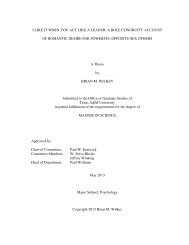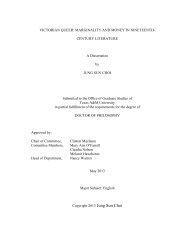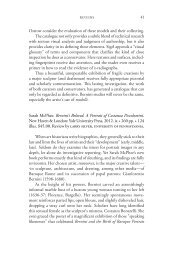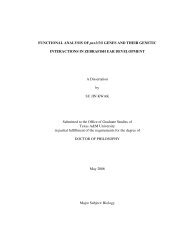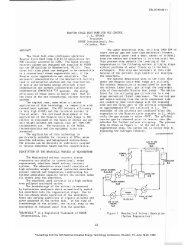THE EFFECT OF ETHICAL SIGNALS ON RECRUITMENT ...
THE EFFECT OF ETHICAL SIGNALS ON RECRUITMENT ...
THE EFFECT OF ETHICAL SIGNALS ON RECRUITMENT ...
Create successful ePaper yourself
Turn your PDF publications into a flip-book with our unique Google optimized e-Paper software.
interpret” ethical codes (Clegg et al., 2007). The organization also plays a role in<br />
encouraging ethical or unethical behavior from its employees. Organizations have<br />
particular ethical practices and behaviors that shape their characters (Cullen, Victor, &<br />
Stephens, 1989). Employees face ethical dilemmas daily, and they often look for<br />
external cues, or signals, as to how to react (Trevino, 1990). Employees who commit<br />
unethical acts are sometimes simply responding to the cultural pressures to behave<br />
unethically (Trevino, 1990). Indeed a strong (unethical) culture can have a “dark side,”<br />
encouraging, or at least legitimizing, unethical individual behavior (O’Reilly & Chatman,<br />
1996).<br />
Social Component<br />
Morality has a large social component. Ethical decisions and behaviors are<br />
affected by the norms of society and business ethics cannot be completely understood<br />
outside the realm of the social environment or culture (Payne & Giacalone, 1990;<br />
Trevino, 1986). One seminal piece in the ethics literature defined an ethical decision as<br />
“both legal and morally acceptable to the larger community,” while an “unethical<br />
decision is either illegal or morally unacceptable to the larger community” (Jones, 1991,<br />
p. 367). This definition recognizes the importance of the law in morality. On the one<br />
hand, morality may overlap with the law; for example committing murder is against the<br />
law and most would agree it is also immoral. On the other hand, morality is like<br />
convention because, unlike the law, it cannot be changed by government acts, and the<br />
result is usually more social (praise or blame), not physical (life in prison or the death<br />
penalty) (Frankena, 1963).<br />
9




